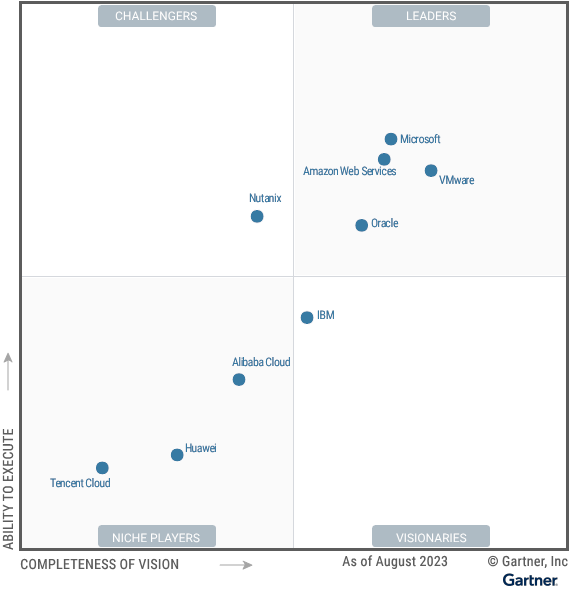In response to customers’ requests for cloud capabilities and agility in edge environments, Microsoft has delivered innovations across various cloud-to-edge products like Azure Arc, Azure Kubernetes Service, and Azure Stack HCI. This year, Gartner introduced a Magic Quadrant for Distributed Hybrid Infrastructure (DHI). Gartner defines DHI as “offerings that deliver cloud-native infrastructure attributes, which can be deployed and operated where the customer prefers. Offerings are software and or integrated hardware with a unified control plane. Distributed hybrid infrastructure provides the foundation for the deployment of applications in a distributed manner that retains a cloud-defined or cloud-inspired approach”. We are thrilled to share that Gartner has positioned Microsoft as a Leader in this new category.

Organizations, regardless of size, continue to drive their digital transformation journey to reap the benefits coming from the delivery of cloud-connected experiences across diverse deployment scenarios. One of the challenges we hear organizations facing in their digital transformation journeys today is how to deliver cloud-connected experiences reliably across a globally distributed footprint that extends to where they live, work, and make decisions. Adopted solutions need to be simple, secure, and observable—in retail stores with no technical staff or factories spread across multiple continents—so you can make local, real-time decisions and draw insights from aggregated data.
Microsoft Azure brings cloud capabilities and agility wherever you need them through a portfolio of services, tools, and infrastructure with Azure Arc. To deploy applications in a data center or at the edge, you can take advantage of Azure services like Azure Machine Learning, Azure Kubernetes Services, and App services—all with a set of comprehensive hybrid and multicloud solutions within a single control plane. For customers looking for an end-to-end Azure experience at the edge, Azure Stack HCI provides a comprehensive curated infrastructure stack that is Azure Arc-enabled and hybrid by design. As a Leader in this new category, Microsoft is committed to helping all organizations centralize control across diverse deployment scenarios and sites and accelerate their digital transformation.
Simplify operations and innovate anywhere
Many of our customers including Carnival, COOP, and SKF streamline their global operations by using a curated choice of Azure technologies, such as Azure Kubernetes Service, SQL managed instance, PostgreSQL, Azure Machine Learning, and Azure Stack HCI, all enabled by Azure Arc. These technologies facilitate the extension of cloud computing beyond the four walls of the data center out to the edge, bringing cloud-native capabilities to retail stores, ships, factory floors, distribution centers, and more. This gives you a consistent operations and management platform that can fully run services not only from a central location but also on-premises in remote locations. This set of technologies provides customers with a holistic, seamless, and more secure approach to innovate anywhere.
The benefits of using these innovative Azure technologies are multi-faceted, showing:
- Reduction in carbon footprint
- Strengthened security posture across all environments
- Simplification of overall management
- Performance improvement
Real life benefits can be seen through these customers’ quotes.
“With the same effort to manage the compute platform at one site, we can now manage the compute platform at 100 sites. It would not be possible without the Azure Arc technologies and the GitOps workflow.”—Mats Iremark: Lead Solution Architect for Hybrid Cloud, SKF Group
“Digital agility affects safety now, and we really believe that Azure Stack HCI can support that with IoT and IoT Edge, which we’re using on ships to transmit data in real time from shipside cloud to the Azure cloud platform.” —Franco Caraffi: IT Operation Director – Global Maritime and Environmental Compliance, Carnival Corporation
“Our Azure Stack HCI deployment has delivered a savings of roughly £400,000 a year on power and cooling alone compared with the C7000 blades we were running.”—Scott Robertson: Principal Enterprise Architect for Foundation Technology, Co-op Group
“So far, we’ve gained around a 30 percent performance improvement with Azure Stack HCI compared with our previous Hyper-V based workloads.”—Scott Robertson: Principal Enterprise Architect for Foundation Technology, Co-op Group
See how you can reap the benefits of hybrid and multicloud strategy and read more about Microsoft strengths in this space. Also, tune into Microsoft Ignite to find out more about the investments we are making in Azure Arc, Azure Kubernetes Service, and Azure Stack HCI to make it even easier for you to manage your Distributed Hybrid Infrastructure.
Gartner, Magic Quadrant for Distributed Hybrid Infrastructure, 27 September 2023, Julia Palmer, Tony Harvey, Michael Warrilow, David Wright, Jeffrey Hewitt.
This graphic was published by Gartner, Inc. as part of a larger research document and should be evaluated in the context of the entire document. The Gartner document is available upon request from Microsoft.
GARTNER is a registered trademark and service mark of Gartner, Inc. and/or its affiliates in the U.S. and internationally, Magic Quadrant is a registered trademark of Gartner, Inc. and/or its affiliates and is used herein with permission. All rights reserved.
Gartner does not endorse any vendor, product, or service depicted in its research publications and does not advise technology users to select only those vendors with the highest ratings or other designation. Gartner research publications consist of the opinions of Gartner’s research organization and should not be construed as statements of fact. Gartner disclaims all warranties, expressed or implied, with respect to this research, including any warranties of merchantability or fitness for a particular purpose.
